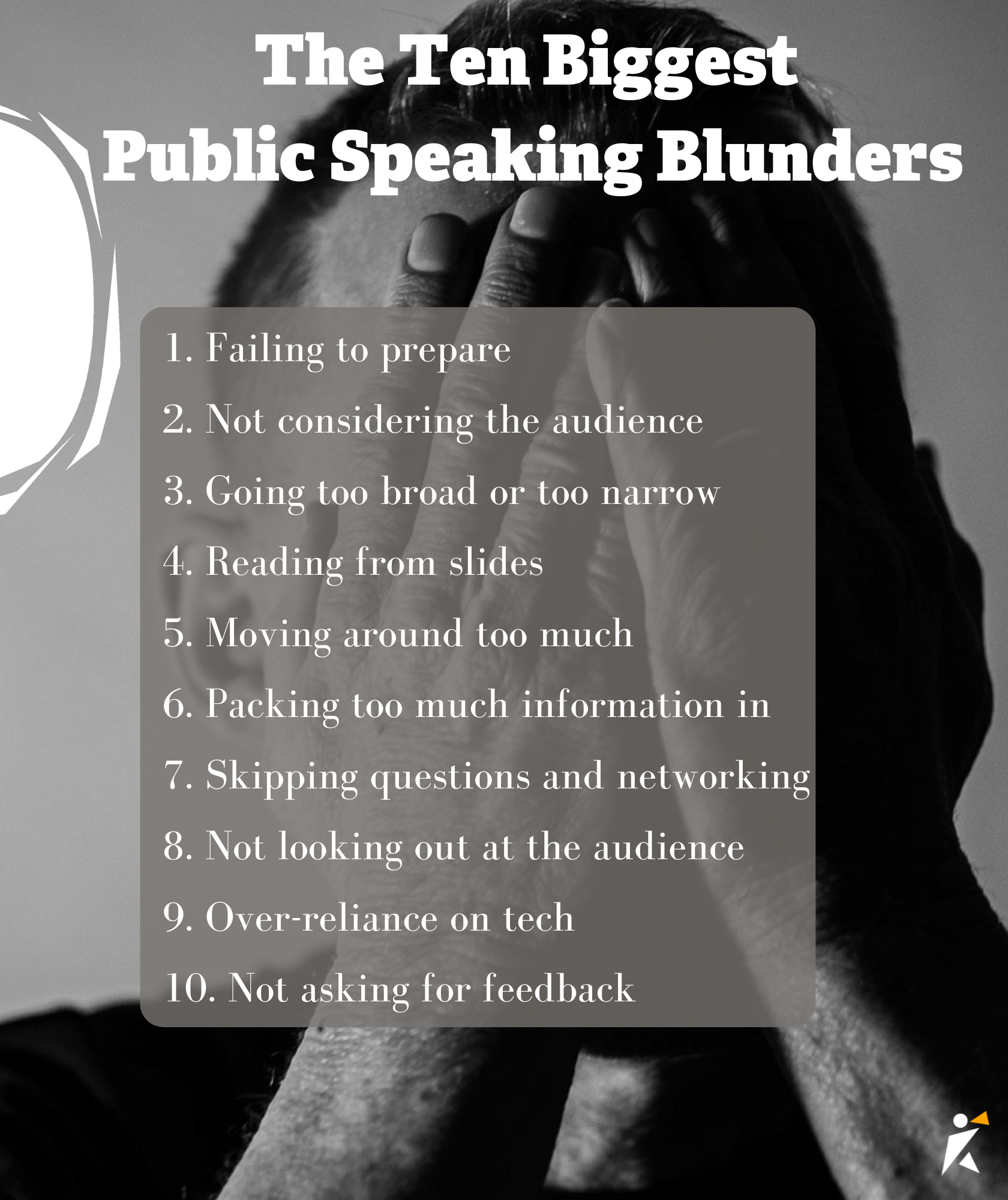The Ten Biggest Public Speaking Blunders

If we want to be the best that we can possibly be, we need to know the potholes that are out there so that we can avoid them. This is just as true for public speaking as it is for something like learning to play guitar or raising a child.
But what are the biggest blunders for public speakers to avoid? And how can we make sure that we don’t fall victim to them?
In this week’s article, that’s exactly what we’re going to investigate.

1. Failing to prepare
This is easily the most common mistake that people make, and we see it happening all of the time. They say that if you fail to prepare, you prepare to fail, and there’s a lot of truth to that. If we want to excel as public speakers and be at the top of our game, we need to make sure that we spend a lot of time preparing for our speeches. There’s no such thing as too much practice.
2. Not considering the audience
You always need to know the audience that you’re going to be talking to, and the earlier you can figure it out, the better. That means that you can tailor your talk to the people you’re speaking to. The goal here is to ensure that you’re giving a talk that’s going to be of value to your audience, and if you don’t know who you’re dealing with then you’re not going to know how to add that value.
3. Going too broad or too narrow
One of the challenges of delivering a speech is that you need to strike the perfect balance between being too niche and being too broad. If your talk is too broad and you cast your net too wide, you’re going to struggle to keep people’s interest because it’s not going to be relevant to them. The same is true if you niche down too much, because if you’re too specific then you’re only going to be adding value to one or two people in the audience.
4. Reading from slides
This is a classic mistake that we see newbie speakers making, and it’s an easy one to make because it almost comes naturally. Slides should always be used to support what you’re saying, rather than to act as a script. The general rule is that less is more with slides, and some of the best presenters use slides that contain only images, i.e. with no text at all. Plus, if you’re able to reduce the amount of text that you’re using on your slides, it’s going to take away that temptation to read from them and ensure that you’re looking at your audience instead.
5. Moving around too much
A little movement can be a good thing, because if you’re standing still all the time then that can leave you looking like a deer in the headlights. The problem is that if you move around too much, it makes you look as though you’re nervous and uncomfortable onstage. Try to limit your movement and use it as a way to emphasize what you’re talking about, rather than moving backwards and forwards by default.
6. Packing too much information in
Another common problem that we see is that public speakers will try to pack so much into their presentation that they’ll overload their audience. It’s pretty easy to spot when this happens because people’s eyes will start to glaze over and they’ll stop taking notes. Basically, people just give up and stop trying to take in what you’re talking about. You want people to take something away from your talk, and that’s just not going to happen if you overload them with too much information.
7. Skipping questions and networking
A lot of speakers are so relieved once their session is over that they either leave the event or they maintain a low profile so that they can take it a little easier. The problem with that is while there’s no denying that you deserve a rest after you’ve delivered your talk, you’re losing out on a lot of the value that comes from speaking engagements if you skip the Q&A sessions or don’t stick around afterwards to network with people.
8. Not looking out at the audience
We’ve all seen a public speaker who doesn’t look at the audience and who spends most of their time looking down at their notes. This can lead to it sounding as though they’re mumbling, and it also means that they miss out on the benefits that come from making eye contact with people. By looking out at the audience and occasionally making eye contact with people, you can make people feel included and ensure that you come across as approachable, rather than seeming to be dictating to them from an ivory tower.
9. Over-reliance on tech
A lot of public speakers use technology, and that’s understandable when it helps them to do a better job. The problem is that a lot of public speakers rely so heavily on technology that they can’t function without it, and that leads to problems when there’s no internet connection or their laptop battery runs down. Technology should serve you and help you to be better at what you do, but it should also be seen as something that’s nice to have, rather than something that you can’t function without.
10. Not asking for feedback
The final big blunder that we see is that people either forget to, or just have no interest in, asking for feedback. Feedback can hurt when it’s negative, but it can also help us to become better at what we do if it’s constructive. Sometimes people give us unsolicited feedback, while at other times, we’ll have to ask them. As public speakers who want to be at the top of our game, we need to go out of our way to get feedback and to learn from it whenever possible.
Conclusion
Now that you know our pick of the ten biggest public speaking blunders and how you can deal with them, it’s over to you so that you can share your thoughts. Have you had to tackle any of these blunders? And if so, how did you approach it?
As always, we’d love to hear your thoughts, so be sure to let us know by leaving a comment so that we can keep the discussion going. You can also follow us on your favorite social networking sites for more. We’ll see you soon for another article!






